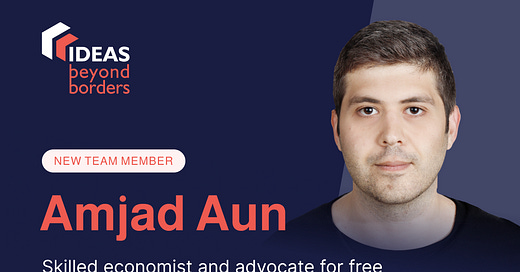From Inflation to Innovation
Welcoming the newest member of the IBB team Amjad Aun, a skilled economist and advocate for free market capitalism in the Arab world
Born and raised in Syria, Amjad Aun’s early life was marked by the challenges of living in a country fraught with political instability. His family suffered economic hardship, which was only made worse by rising inflation. One US dollar was once worth 50 Syrian pounds—today, one dollar is worth roughly 13,000. As his parent’s savings continued to lose purchasing power and his father lost his medical practice, Amjad knew he had to leave Syria to prosper and reach his full potential. He excelled academically, particularly in mathematics, which initially led him to pursue civil engineering. However, his true passion lay elsewhere. Whether he knew it at the time or not, Amjad’s first-hand experience with Syria’s failing economic system would plant the seeds for his future academic career and life's work.
In 2017, Amjad seized an opportunity to study in Germany. This move proved pivotal, as it allowed him to explore new academic fields and broaden his intellectual horizons. Initially, Amjad enrolled in a business administration program. It was during this time that he was introduced to the works of influential economists such as Friedrich Hayek. Reading Hayek’s “The Constitution of Liberty” and “The Fatal Conceit” ignited his passion for economics. He decided to shift his focus to economics, specializing in finance, which he views as applied economics. He pursued a master's degree, where he wrote his thesis on integrating Hayek’s concept of spontaneous order with Giovanni Dosi’s theories on innovation. This interdisciplinary approach demonstrated his ability to blend different schools of thought, highlighting his pluralist perspective similar to that of Isaiah Berlin. Currently, Amjad is working towards his PhD, focusing on the economics of science, specifically on how scientific knowledge is generated and disseminated.
He was accepted into the highly selective Austrian Academy for Economics and Philosophy, where he was taught by renowned economists and philosophers such as Martin Rhonheimer, Stefan Kooths, and Philip Booth. Additionally, he participated in a workshop on Objectivism and economics at the University of Texas at Austin, further broadening his intellectual horizons and deepening his understanding of economic principles. Beyond his academic pursuits, Amjad has been actively involved with Students for Liberty (SFL) in Germany. During the COVID-19 pandemic, he played a crucial role in rebuilding the SFL team, emphasizing diversity and international collaboration. His efforts culminated in his appointment as the National Coordinator for Germany, where he successfully recruited a dynamic team of both German and international students. He also volunteered with Caritas, teaching mathematics, physics, and the German language to refugee children and children from low-income German families.
Amjad’s work with the Consumer Choice Center further solidified his reputation as a diligent researcher. Notably, he co-authored a study on European railway stations that garnered significant media attention, including coverage by Bloomberg. His dedication to humanitarian efforts has been a consistent theme throughout his life. During the Syrian war, he volunteered with the Syrian Red Crescent, providing crucial assistance to internally displaced persons (IDPs).
Amjad’s worldview is deeply influenced by classical liberalism and the principles of free markets. His engagement with these ideas is not purely academic; it is driven by a genuine belief in their capacity to improve societies. He appreciates the philosophical underpinnings of economic theories and values intellectual honesty and rigorous analysis over emotional responses. He says, “When I say I love capitalism in the Arab world, that's like a taboo, you know, because for them it's like ‘Capitalism! That's colonialism—those people want to take our resources.’ But I think in the long run, economic freedom will lead to more political freedom in the region.” This is exactly the kind of problem Ideas Beyond Borders is working to solve. Like Faisal, President and Founder of Ideas Beyond Borders, always says, “You can’t expect people to fight for democracy if they don’t know what democracy means.” To Amjad, the work is about identifying and implementing a system that functions and a framework that respects natural rights within societies with varying values and beliefs. To do that, educating the Arab world about the benefits of free-market capitalism is essential. That is why we are thrilled to have welcomed Amjad to the IBB team as an advisor and scriptwriter focusing on economics.
Our latest Bel Arabi podcast episode, “Why I Love Capitalism,” in which Maher Gabra interviewed Amjad, received over 600,000 views across MENA. He effectively articulated complex economic ideas in Arabic, challenging prevalent misconceptions and encouraging a more nuanced understanding of capitalism and free markets. One viewer wrote in a comment expressing the need for capitalism: “Excellent discussion. We need capitalism in Arab countries.” Through his work individually and with IBB, Amjad is moving the needle toward free market capitalism in the Middle East, one podcast listener at a time.
Despite his busy schedule as a PhD student, Amjad continues to advocate for liberty and economic freedom. He firmly believes in the potential of free market capitalism to transform the Arab world, provided societal attitudes towards these concepts shift.
Amjad’s journey from Syria to Germany, combined with his academic achievements and advocacy work, make him a compelling figure in the global discourse on liberty and economic freedom. His story is a testament to the power of education, intellectual curiosity, and the enduring quest for a freer and more prosperous world. We are thrilled to have welcomed him to the Ideas Beyond Border’s team. With his help, we will reach more people in MENA and foster a better understanding of free markets, free people, and respect for human dignity.
This article was written by Reid Newton.





